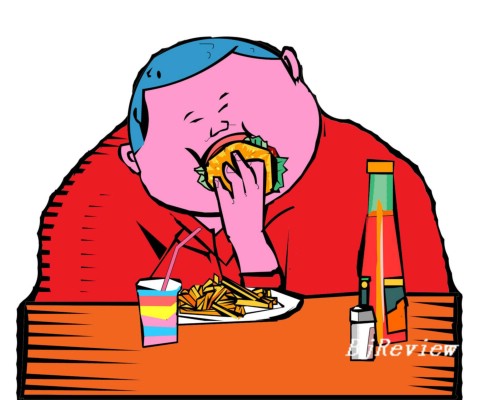
Four decades ago, mothers across the world used to tell their children, "Eat all your food, people are starving in China." But that was a long time ago and things are different now.
In fact, things are so different that far from having too little to eat, the pendulum has swung way over the other side.
I sat in the corner of a downtown Beijing McDonald's, sipping a hot chocolate, crowd watching. It's my favorite pastime in China. Nearby a mother and her young boy, who couldn't have been more than eight, plunked themselves down and unloaded their tray.
I watched as the boy munched his way noisily through two cheeseburgers, two large French fries, a large coke, an apple pie and some kind of ice cream mix. What was fascinating was the systematic way he ate-it was more an act of devouring. What made this scene worth watching was that the boy was plump to the point of being obese. His cheeks began where his eyes ended and the flesh fell down his body in rolls. None of this seemed to bother his mother, who actively urged him on with encouraging proud pats on the head and cooing noises. She smiled lovingly at her chubby pride and joy, eating nothing herself-so attentive that she even wiped away the tomato sauce that dribbled down his dimpled chin.
Glancing around the room, I saw there were at least five other podgy boys and adults, presumably parents, in the same feasting process. Bountiful is the word that came to mind.
It wasn't so much that these boys were eating like there were no tomorrows, it was like today had become tomorrow.
There is something inherently wrong with seeing a fat Chinese. It's like seeing a white Ferrari or watching Jackie Chan in a love story. It's just not right somehow. After all, this is the nation that is known for its slim healthy lifestyle.
And the saddest thing is that it's the Chinese children bloating up faster than you can say pass the double thick milkshake. Put it down to the fact that these "little emperors" are being given everything that their now affluent parents never had as youngsters (they don't need to give it all in one day) or that in some convoluted way fat means well-off and healthy to many proud parents.
"The old saying, 'A fat child is a healthy child,' is still too prevalent," Ji Chengye, a leading child-health researcher said in a report in USA Today.
The report on January 9 quoted statistics recently released from the Chinese Ministry of Health showing that city boys aged 6 are 2.5 inches taller and 6.6 pounds heavier on average than they were 30 years ago.
The report says China "has entered the era of obesity," according to Ji.
USA Today says most of the growth spurt among Chinese children has taken place over the past decade.
Education Ministry data say today 8 percent of 10-12-year-olds in China's cities are considered obese and an additional 15 percent are overweight.
The overweight scenario brings with it serious consequences for these rotund minors.
According to a World Health Organization survey on Chinese children's nutrition and health published in Xinhua in June last year, increasing numbers of young people are falling victim to diabetes and other chronic conditions such as high blood pressure and high cholesterol.
The survey said about 17.9 million children aged 6 to 17 are plagued by high blood pressure, 590,000 have been diagnosed with diabetes and 5.6 million have too much fat in the blood.
These conditions previously only affected adults.
"The ratio of overweight pre-school children was only 0.84 percent in 1996. It has almost quintupled in the past 10 years," said Xia Li, Vice Dean of the Health Center of Nanjing Maternity and Child Health Hospital, talking to Xinhua in June 2006 after his hospital had conducted a survey of 2,000 young people.
The government is battling the juvenile bulge, in part, by building more playgrounds and requiring students to exercise or play sports for an hour a day at school.
But it's not only about more exercise.
Pan Beilei, Deputy Director with the government-affiliated State Food and Nutrition Consultant Committee, said at a conference on food consumption in Beijing last November that unbalanced diets have led to various health problems.
I watched as the super-sized Chinese boy and his mother got up to leave. She beamed at him and took his chubby hand leading him out. As he waddled away, I thought those extra rolls he was carrying are the price Chinese are paying for their new prosperity and lifestyle.
Perhaps it is time that the relationship between the growing economy and even faster growing waistlines got some heavy thought-and doting parents learned to say "No."
| 